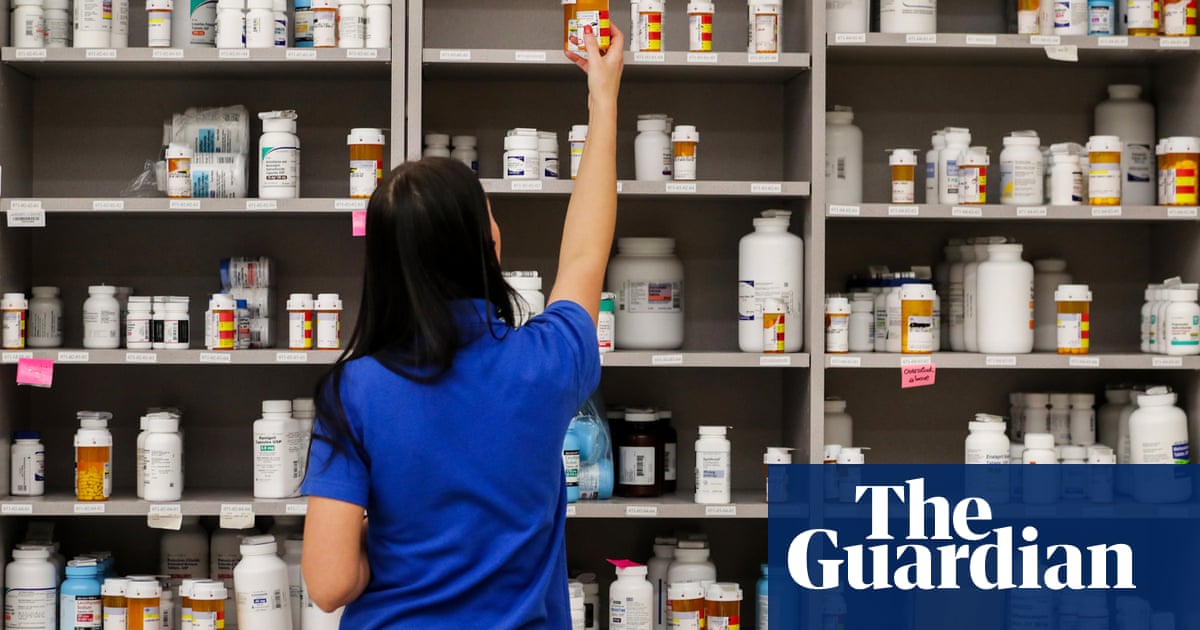Americans would suffer most ifDonald Trumpimposed tariffs on imports of pharmaceuticals, as medications would become more expensive and potentially unaffordable for some people, drugmakers have warned.
Drugmakers have been braced for targeted border taxes – similar to the 25% levies on steel, aluminium and car imports – after the US president threatened to hit the sector and announcedan investigationlast month. Last week, Trump hinted at a possible reprieve for companies, saying they would be given time to move their operations to the US, But “after that it’s going to be a tariff wall put up, and they won’t be happy about it,” he added.
Giovanni Barbella, the global head of strategy and supply chain at the Swiss multinational Sandoz, said tariffs would lead to supply disruptions and in the medium term price increases, hitting US patients hardest. Sandoz is one of the world’s biggest makers of generic drugs – cheaper versions of branded medicines whose patents have expired. The majority of prescription drugs sold around the world are generic.
“We are producing products on a very tight margin,” Barbella said. “That’s the nature of our industry. So ultimately, higher production cost, including the cost of tariffs, will lead to higher prices.”
He added: “There can be even more supply disruption, because some players can leave the [US] market and focus on markets where they can make more business. So ultimately, the risk is that the US patient will suffer the most.”
There are already persistent drug shortages in the US, the UK and other countries, and tariffs would potentially exacerbate that by disrupting the long and complex global supply chains.
Mark Samuels, the chief executive of Medicines UK, which represents Britain-based generic drugmakers, said: “In an insurance-based system, as the US has, if medicine costs increase and insurance runs out, then that does increase the risk that people either can’t afford to complete their cancer treatments or pay for it altogether.”
A 25% US tariff on pharmaceutical imports wouldincrease drug costs in the country by almost $51bn (£38bn) a year, raising prices by up to 12.9% if passed on, according to an analysis by the accountancy firm EY that was commissioned by the Pharmaceutical Research and Manufacturers of America, the main US industry group.
In an attempt to head off looming tariffs, theSwiss drugmakers Rocheand Novartis are investing $50bn and $23bn respectively in the US in coming years. Britain’s AstraZeneca announced a $3.5bn investment in November and said last week it wasshifting the production of some medicines sold in the USfrom Europe to the States. The US firm Eli Lilly, the maker of diabetes and obesity drugs Mounjaro and Zepbound, is spending at least $27bn to build four new manufacturing sites in the US.
Johnson & Johnson is putting $55bn into US manufacturing and research over the next four years. The New Jersey-based company is more vulnerable to any US tariffs because of its significant manufacturing across Europe including the UK, Ireland, Switzerland, Italy and Belgium.
Sandoz said that while pharmaceutical companies – which command higher prices for their products – could shift production to the US, it was much harder for generic drugmakers to do so. The drugs they make are cheap – a small pack of paracetemol costs from 37p at UK supermarkets – and the companies operate on tighter profit margins.
About a quarter of generic medicines prescribed by the NHS are made in the UK, a third come from India and the rest from the EU, according to Medicines UK while China and India are the two main sources of medicine ingredients.
Sign up toBusiness Today
Get set for the working day – we'll point you to all the business news and analysis you need every morning
after newsletter promotion
Sandoz produces the main substance for antibiotics such as amoxicillin at its own sites in Austria, Spain and Slovenia, and the finished product in Austria. For other medicines, it sources the active ingredient from suppliers in India or China, and makes the finished product in Poland, Germany and Turkey.
Packaging is manufactured in Poland and Slovenia. The company also has a US-approved site in India that makes finished product and packaging, and a site in Brazil that produces for the local market.
For biological drugs, which are derived from living organisms, Sandoz sources the main substance from its former parent company Novartis in Europe, but is building its own manufacturing site in Slovenia.
Gareth Sheridan, the chief executive of the Irish-founded, Nasdaq-listed pharma company Nutriband, has warned that lives could be lost if tariffs are imposed on medicines.
“These types of treatments can’t afford a disruption in the global supply chain,” he told the BBC recently. “As a comparable situation, tariffs on automobiles. You can’t afford a BMW? Buy a Ford and you can still get to work. If you have a 25% hike on chemotherapy and you can’t afford your treatment any more, what’s the alternative? I mean, ultimately, people are going to die.”
